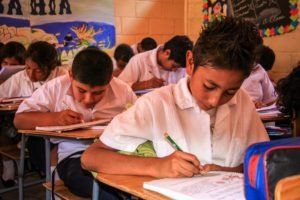Here in Honduras, it’s easy to be hopeless about healthcare and public hospitals. In 2013, an ASJ report revealed that for decades medicines were being stolen from public hospitals. It provided proof that millions of dollars’ worth of medicine were being robbed from the state-controlled Central Medicines Warehouse, possibly to be sold on the black market.
December 6, 2016
By Natalie Acosta
Every time I open my news feed on Facebook I read hopelessness everywhere. Publications from the most popular newspapers and the comments people make on them all reflect a very common sense of despair about the situation in Honduras.
Whenever I talk with a taxi driver, or the lady that sells groceries at her “pulperia” (Honduran word for mini market), I get a feeling of how much they’ve lost their faith in change. And I don´t blame them. Despite the fact that statistics show that corruption and homicide levels have decreased in Honduras, people don´t feel like it´s actually happening.
Turning on the radio station to listen to politicians while they promise “Honduras is changing” seems quite discouraging when you don’t feel safe while you walk on the streets or whenever you still hear about small businesses forced to close their doors due to extortion from gangs.
Often this hopelessness is based on the reality that people are living.
How can we call a woman hopeless when she’s a single mother with five children to feed and can’t find a job anywhere? How can we call a young migrant hopeless when he leaves the country to save his life from gangs who threaten to kill him? We should ask ourselves, am I just preaching hope, or am I doing something to bring hope to people? What am I doing to bring hope to their hearts?
Whenever people ask me what do I do for a living and I tell them I´m part of a Christian NGO called the Association for a more Just Society (ASJ, formerly known as AJS), I receive many different reactions. With all the difficulties in the country, some think our cause is very unrealistic.
Working for a more just society in a country with so many inequalities must be tough, crazy or impractical. But my favorite part of my job is telling people that it’s possible.
Once I start giving details about our programs and the impact they’ve had in thousands of lives around the country, people’s perspectives slowly start to shift. Suddenly, our “unrealistic mission” as brave Christians leading changes to make Honduran government systems work becomes appealing. I bet there´s not a single Honduran who despite their personal experience or distrust in government systems, wouldn’t feel more optimistic once they hear our stories.
Patients died because they did not get the medicines they need. In other cases they were forced to pay for treatment at private clinics because the system wasn’t able to help them, endangering the lives of untold numbers of poor Hondurans and others who needed medicine the most.
But after ASJ revealed the extent of this corruption, changes started to happen. Thirteen people were charged with crimes and the Director of the Central Medicines Warehouse was arrested. Now, medicine purchasing is done through the United Nations Office of Project Services, which helps to make the process more transparent. There is still a lot of work to be done in the Honduran healthcare system, but we are seeing that change is possible.
Through investigations, we found out at least one of the reasons why: some 15,000 of those teachers weren’t actually working in the schools they were assigned to. Some had died, and their kids were still cashing their paychecks. Some had moved to the United States. Some were collecting pay for working in rural areas even though they had taken other jobs in cities, leaving rural kids with no teachers. That revelation came courtesy of a coalition of civil society organizations led by ASJ, called Transformemos Honduras, or Let’s Transform Honduras (TH).
We published this information on our website, encouraged parents, and volunteers to check up on whether teachers were at their jobs or not. As a result, for four years in a row we have celebrated more than 200 days of class and now estimate that less than 1% of “ghost teachers” remain in public schools.
These examples are more than statistics, they represent real people with real stories.
One of these stories is my own: in 2009, my own family suffered a tragedy. In March of that year, two of my uncles, both brothers of my mom, were killed because of an alleged attempt to rob them. I can remember perfectly the terrible pain my grandmother went through and the fact that the corresponding authorities did nothing to investigate the crimes. My family is still outraged about this. Because I have experienced personally how much violence can affect the lives of the people around us, I feel very touched whenever I think about how many families in my country suffer this sort of loss and the impotence of not having enough trust to do something as simple as calling the police to receive their assistance.
But we have been working hard to reform security in Honduras. Recently, Honduras has witnessed an unprecedented reform via the much-lauded police purge and reform commission, led by four members of our ASJ Board. In only seven months, the commission has dismissed more than 1,651 officers and referred more than 600 of them to the Attorney General’s Office for possible criminal prosecution. Our country has spent years with sky-high homicide, corruption, and impunity rates. But the trends are beginning to turn. Bold initiatives like this one give hope for a different future, one where citizens trust the police, where criminals face justice, and where all can live in peace.
Tragedies have a way of going viral; good news, not so much.
Sharing hope means working to improve the lives of our neighbors, but it also means sharing these stories so others can understand why we’re hopeful. Just as the example of the single sheep that got lost (Matthew 18:12), each person who feels safer and more hopeful is worth the effort we put in our work.
“Sometimes we feel that what we are doing is just a drop in the ocean. But the ocean would be less because of that missing drop” said Mother Theresa. Even as we feel that what we do won´t make much difference, it does. I see it in the faces of people who, after hearing our stories, feel that there really is hope for Honduras. Then together, we can leap from hope into action.






















